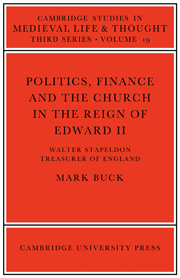Book contents
- Frontmatter
- Contents
- Dedication
- Acknowledgements
- Abbreviations
- 1 INTRODUCTION
- 2 FAMILY AND EARLY LIFE
- 3 THE BISHOPRIC OF EXETER
- 4 ROYAL FREE CHAPELS
- 5 THE FOUNDATION OF STAPELDON HALL
- 6 POLITICS AND DIPLOMACY 1309–13
- 7 THE CONSOLIDATION AND COLLAPSE OF ROYAL POWER 1320–1326
- 8 THE EXCHEQUER
- 9 THE CASE AGAINST STAPELDON
- 10 MURDER
- Appendix of documents
- Bibliography
- Index
9 - THE CASE AGAINST STAPELDON
Published online by Cambridge University Press: 05 November 2011
- Frontmatter
- Contents
- Dedication
- Acknowledgements
- Abbreviations
- 1 INTRODUCTION
- 2 FAMILY AND EARLY LIFE
- 3 THE BISHOPRIC OF EXETER
- 4 ROYAL FREE CHAPELS
- 5 THE FOUNDATION OF STAPELDON HALL
- 6 POLITICS AND DIPLOMACY 1309–13
- 7 THE CONSOLIDATION AND COLLAPSE OF ROYAL POWER 1320–1326
- 8 THE EXCHEQUER
- 9 THE CASE AGAINST STAPELDON
- 10 MURDER
- Appendix of documents
- Bibliography
- Index
Summary
Five principal pillars of Edward II's last years' government are identified by the first statute of his son's minority: the Despensers, Robert Baldock, the earl of Arundel and the bishop of Exeter. Stapeldon's inclusion in this list is the most equivocal. He is not named with the other four in those portions of the statute which deal with the accroaching of royal power. It is therefore the more striking that his name is added in c. 3, which deals with fines, sales, gifts of land and recognisances of debt procured by force and duress. This accusation is corroborated by the usually reliable Vita Edwardi Secundi, which explains that Stapeldon was removed from office in 1325 for avarice and corruption: he was ‘ultra modum cupidus et durante officio suo uehementer dives effectus’. And the Vita follows this up with the same proposal as is found in a vacated petition on the roll of London petitions presented at the parliament of January 1327: that the great offices of state be made annual so that complainants should have the opportunity of obtaining justice after the year was over. There is evidence that after his removal from the treasurership suits were brought against Stapeldon. Thus on 26 April 1326 he received special permission from the king to appoint attorneys on account of his being ‘often impleaded by some scheming to put him to labour and expense in the courts of the king and others’.
- Type
- Chapter
- Information
- Politics, Finance and the Church in the Reign of Edward II , pp. 197 - 216Publisher: Cambridge University PressPrint publication year: 1983



